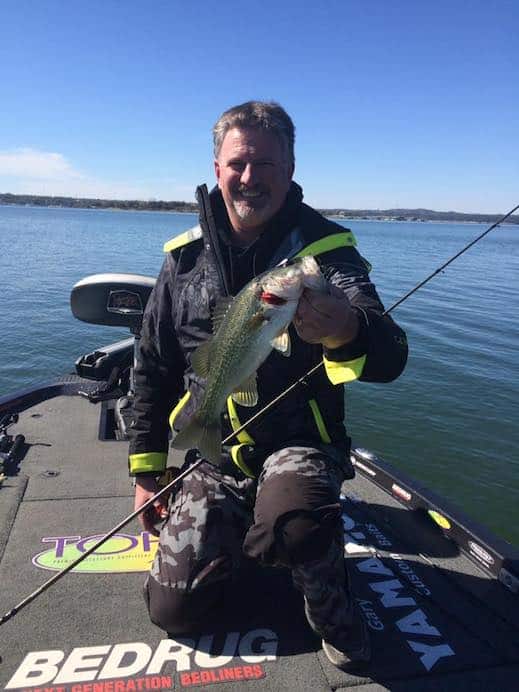Falcon Lake Fishing Charters & Guides
- 24ft Bay Boat
- Max Guests 4
- From $500.00
- View Available Trips
- 32ft Center Console
- Max Guests
- From $0.00
- View Available Trips
- 21ft Bay Boat
- Max Guests 6
- From $425.00
- View Available Trips
- 25ft Bay Boat
- Max Guests 5
- From $625.00
- View Available Trips
- 17ft Flats Boat/skiff
- Max Guests 3
- From $400.00
- View Available Trips
- ft
- Max Guests 5
- From $600.00
- View Available Trips
Falcon Lake, TX
Mean, monster largemouth bass. That’s the answer to the question, “Why do you fish Falcon Lake?” that most fishermen would give you after a trip to the huge reservoir on the Texas-Mexico border. There’s no scientific measurement for it, but bass fishermen from amateurs to top pros all say the same thing about Falcon’s fishery. The largemouth bass grow big and they grow mean. They fight like no others. It isn’t uncommon to hear reliable stories of anglers hanging into lunker largemouths on strong tackle and line and never being able to turn the fish. The current lake record is 15.63 pounds, a 28-inch fish caught in 2011. But veteran anglers there know for a fact that much larger bass are lurking in those waters. They’ve hooked them, seen them, and lost them. Falcon Lake is a reservoir on the Rio Grande just 40 miles southeast of Laredo, Texas. It was developed in 1953 when the two countries, led by Mexican President Adolfo Ruiz Cortines and U.S. President Dwight D. Eisenhower, cooperated to build the giant lake. The reservoir was formed by the construction of the Falcon Dam to provide water conservation, irrigation, flood control, and hydroelectricity to the area. Falcon covers a surface area of 83,654 acres at pool stage. The lake has a combination of deep and shallow water, with the deepest going more than 100 feet at the dam area. One of the main challenges on the lake is that water fluctuates drastically, sometimes 40 to 50 feet or more over a year or two, based on rainfall and water usage. The upper reaches of the lake are pretty turbid and often muddy. The lower end of the lake is clearer, but still stained like most huge lakes in that part of the country.
Fishing Falcon Lake
The lake’s largemouth bass are the key draw, as witnessed by the hundreds of major tournaments that have been held there. Besides largemouth bass, there are also white bass, black crappie and flathead catfish. And gar….lots of gar, probably well over the 249-pound lake record that was caught in 2014. There are also carp, tilapia, bluegill and sunfish in the lake. The only reason Falcon Lake is popular with bass anglers isn’t just monster bass, even though fish over 10-11 pounds are caught almost weekly when fishing conditions are good. There are also lots of “smaller” bass of all sizes. And the lake is like a live “Bass Fishing 101” playground. You can catch bass shallow on spinnerbaits and worms. You can find them on points with crank baits and jigs shallow and deep. And you can catch big ones in the thick brush with plastic worms and creature baits in all depths of water. The lake offers a place for just about any kind of bass technique or structure you want. Because of the size of the fish and the rough territory, anglers need to come armed with sturdy equipment and heavy braided line. Anything else and you are playing against the odds. Bigger baits are also necessary. Anglers fish with the largest crank baits available and often fish 11-14 inch thick bodied plastic worms for the really big ones. Crappie fishing is making somewhat of a comeback with most being caught around docks, bridge pilings and brush along the deeper edges. Live minnows and small jigs fished on light lines work best. Catfishing is best around the dam, near both the Little and Big Tigers, and up the Rio Grande. Shad, shrimp, nightcrawlers and stinkbait are best baits. A unique aspect of Falcon are giant alligator gar that have become popular with bow fishermen. It isn’t unusual for triple digit gar to be taken. The large populations of predatory gar also threaten sportfish populations when the lake is extremely low.
Visiting Falcon Lake
There are two major launch areas on Falcon Lake. The first is located off U.S. Hwy 83 south of the Arroyo Veleno Bridge. It is operated by Zapata County, is free, and accommodates all kinds of boats. There is also a large ramp at the Falcon State park 30 miles south of Zapata. You do have to pay a park entry fee to use this ramp, operated by Texas Parks and Wildlife. There are numerous guides, tackle stores and sporting goods stores in the area where you can find out about the latest regulations and limits. Fishing in an international reservoir such as Falcon requires that anglers are up to speed on all the rules and proper licenses.


